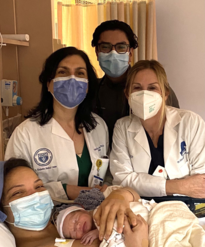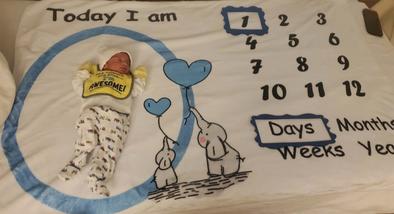Nurses Deliver Exceptional Care to Help Type 1 Diabetes Patient on Her Journey of Motherhood During COVID-19 Pandemic
When Endocrinology nurse Bryan Hernandez, BSN, RN, saw baby James safely delivered and in his mother’s arms on January 20 at St. Elizabeth’s Medical Center, his first thought was “Mission Accomplished.” The birth of James was the cherished moment his mother, Judit Balbi Lopez, a Type 1 diabetic, had yearned for, and the culmination of a pregnancy journey with her care team who, through the wonders of technology during the COVID-19 pandemic, rarely left her side.
Judit, 36, of Milford, was diagnosed with Type 1 diabetes at age 15 while still living in her native Dominican Republic. Type 1 diabetes is an autoimmune disease in which a person’s pancreas does not make insulin. Judit in particular has “difficult to control” diabetes, which is part of a small subset of Type 1 diabetes characterized by high and low blood glucose variability in the day-to-day life that makes her disease difficult to manage. Her son, Ryan, 4, was born at 26 weeks gestation in 2016 and was in the Neonatal Intensive Care Unit for many weeks. Always a high-risk pregnancy, Judit over the years also experienced several pregnancy losses, which made the birth of James at 36 weeks, 5 lbs. and 6 oz. that much sweeter. 
“There’s not a word to describe all the things they do for me, but for me it’s ‘love.’” Judit said of her Steward Medical Group Endocrinology care team of Bryan, and his colleagues Susan Berry Cann, DNP, and Endocrinologist Dr. Catalina Norman. “This for me, it means more than I can say.”
Judit came into Bryan’s and Susan’s care in 2016 when she and her husband, Edgar Alvarado, were expecting Ryan. They quickly formed a tight bond and worked diligently to manage her through that successful pregnancy. Following a later pregnancy loss, the Endocrinology team, working collaboratively with OB/GYN Nurse Practitioner Jennifer Andrade, switched Judit from self-administered insulin injections to an insulin pump to allow for more precise insulin dosing.
“Type 1 diabetes is hard on any given day and even more so during pregnancy… it’s a tightrope walk for eight-and-a-half months, said Susan. “There’s an enormous amount of self-management on the part of the patient. Every day, she’s making decisions and adjustments 24/7 and Judit just did a great, great job.”
In addition to carefully monitoring blood glucose levels, patients with Type 1 diabetes need to carefully plan their meals and their activities. For someone with Type 1 diabetes, the target range of blood glucose levels is between 70 and 180 mg/dl, Susan said, however, for a pregnant Type 1 diabetic, that range shrinks to between 63 and 140 mg/dl.
“High blood sugar is not good for a baby’s development at any stage during pregnancy,” she said.
High and low blood sugar levels can lead to complications for the developing baby. Complications can include major birth defects (cardiac, brain, spine, urinary, and digestive system malformations) especially associated with persistently high blood glucose levels during the first trimester, trouble breathing, and incomplete lung development if the baby is delivered early, large baby (macrosomia), premature delivery, and placental insufficiency as well as stillbirth.
“We had no margin for error,” Dr. Norman said of the team’s care of Judit and her unborn baby.
Treatment through Technology
To manage her diabetes, Judit wears a sensor slightly larger than the size of a quarter on the surface of her abdomen and via a tiny plastic catheter that goes through the skin it measures her blood glucose levels continuously. The sensor, with the help of a transmitter, communicates to an insulin pump that is about the size of a small cellphone that is worn on a belt clip or in her pocket. The pump holds a small reservoir of 300 units of rapid-acting insulin which requires changing every three days.
Bluetooth technology allows Judit’s sensor, which she replaces every 10 days, to communicate with her insulin pump to record her levels. When her glucose sensor indicates she needs more or less insulin, the pump, which is regulated through a computerized algorithm, dispenses the appropriate amount through the tiny tubing and into her body. As long as she has wi-fi or cellular data access, this information can connect to the cloud through an app on her phone, and Bryan, Susan, and Dr. Norman can remotely monitor her blood sugar levels and quickly advise her if she needs to make any adjustments.
“The technology piece is huge,” Susan said. “Any time of the day I can go onto the clinic portal and I can see how Judit is doing. If I was up at 3 a.m., I might take a little gander at Judit’s blood sugar, or, on a Saturday, I might take a look at what’s happening.”
Those remote checks led to many phone calls to Judit throughout her pregnancy, sometimes as early as 6 a.m., and, at times, multiple calls a day, contact that deepened the already strong bonds among the nurses, doctor, and their patient.
“Sometimes I felt like Susan was my mom,” Judit said. “When my sugar was low, they called me. When my sugar was high, they called me. She would call and say, ‘Judit, I just want to be sure that you’re doing OK,’” Judit said. “It wasn’t just me- they took care of the baby and they were trying to help me also.”
Because of the pandemic, Judit preferred telehealth virtual visits over in-person care to help safeguard herself, Ryan, and Edgar. Her telehealth visits also included some Dr. Norman conducted from her native Romania, where she travelled to in the fall of 2020 to assist family and wound up staying for an extended period after contracting COVID-19. She experienced a mild case of the virus and fully recovered, working throughout her illness to care for her patients.
Care That Felt Like “Family”
Being pregnant during the COVID-19 pandemic was difficult, Judit said. She rarely left home and one of her few destinations was appointments with her obstetrics and maternal fetal medicine team at St. Elizabeth’s, who worked closely with the Endocrinology team.
“Her care was exceptional” said Dr. Lucy Bayer-Zwirello, a maternal fetal medicine specialist at St. Elizabeth’s. “Pregnancy is so changed because of diabetes, and diabetes is so changed because of pregnancy. It has to be a team effort. Her diabetes was very complex, but the pregnancy made it so much harder to treat.”
Between Dr. Bayer-Zwirello and OB/GYN Nurse Practitioner Jennifer Andrade, Judit’s obstetrics and maternal fetal medicine appointments could take up to 90 minutes to ensure labs were drawn, ultrasounds completed, and non stress tests, a common prenatal test to check a developing baby’s health, were conducted.
Judit also bore close monitoring because as a Type 1 diabetic, her diabetes could be “severely influenced” by the pregnancy, Dr. Bayer-Zwirello said. Her diabetes also made her a risk for pre-eclampsia, a complication where she could develop high blood pressure and experience damage to liver and kidneys, or other organs.
“She was a challenging patient in the sense that we loved her dearly and worked very hard with her,” Dr. Bayer-Zwirello said. “Our whole goal in life is to have happy mother, a healthy mother and a healthy baby at the end. With Judit we achieved that goal between the two services.”
When at St. Elizabeth’s for her OB and MFM appointments, Judit would typically be met before or after by her Endocrinology team which was a comfort as due to COVID-19 restrictions at the hospital at the time, she had to attend appointments alone. The care she received extended beyond appointments. She tearfully recalled how when one day she didn’t feel like eating due to nausea from her pregnancy Dr. Norman, her endocrinologist, sent her two boxes of nutrition bars and drinks specially made for diabetics. As her pregnancy progressed, they even talked of having a gender reveal at the Endocrinology office with Bryan selected to deliver the exciting news to the expectant parents.
“I’m not a patient,” Judit said of working with her care team. “I’m one of their family.”
Sweet Baby James
For Susan and Bryan, Judit’s pregnancy journey was one that has made them reflect on their calling to be a Nurse and how well they work together as a team in the care of their patients. Susan has been caring for patients for more than 20 years; Bryan for 10 years.
“Especially with pregnancy, I’m taking care of two people,” Susan said. “I want them to feel like I’m with them. I’m right there any time. I’ve got their back and I’m helping them the whole way. I hope I do that for people….we’re just a good team and she’s a part of that team. The patient has to be a part of the team.”
Dr. Norman echoed the sentiment. “I’m grateful to work here with wonderful nurses. It takes a team to help someone understand and manage such a complex disease,” she said.
When the day came to deliver James, Judit was ready, even with the pandemic marching on. Dr. Bayer-Zwirello oversaw the delivery.
 “I never felt afraid to have him. The hospital was clean, the nurses took care of me,” Judit said. “James was totally fine. I felt like ‘Thank God,’ because I was so worried about him to come into this world with this virus. He did great. He came in healthy and strong.”
“I never felt afraid to have him. The hospital was clean, the nurses took care of me,” Judit said. “James was totally fine. I felt like ‘Thank God,’ because I was so worried about him to come into this world with this virus. He did great. He came in healthy and strong.”
She is grateful to all the nurses, physicians, and staff who had a part in the care she received at St. Elizabeth’s. Later this month she, Ryan, and Edgar will travel to the Dominican Republic to introduce James, who is now 14 lbs. and growing, to her family. And, thanks to technology, her Endocrinology team will be able to continue to monitor her diabetes while she is there.
For Bryan, who is completing his nurse practitioner education, Judit’s journey taught him a lot.
“As a nurse, seeing a patient in unfortunately their worst moments, it opens our eyes that other people are going through difficult things. You play a role in that and you advocate for them. You hold their hand, you teach them, and you motivate them to improve their health,” he said. “At the end of the day you want them to feel better and you want them to succeed in their disease.”
The elation of seeing James born, the tears of joy Susan, Dr. Norman, and he witnessed when they went to see him for the first time will remain a treasured memory, Bryan said.
“It was really rewarding,” he said. “It’s just the memory of that pause, that we were in a kind of complete happiness for that moment, given the pandemic, our own personal struggles and her struggles, and ‘Mission Accomplished’ and this was the miracle that came about.”
To find a doctor or schedule an appointment, visit Steward DoctorFinder™.
